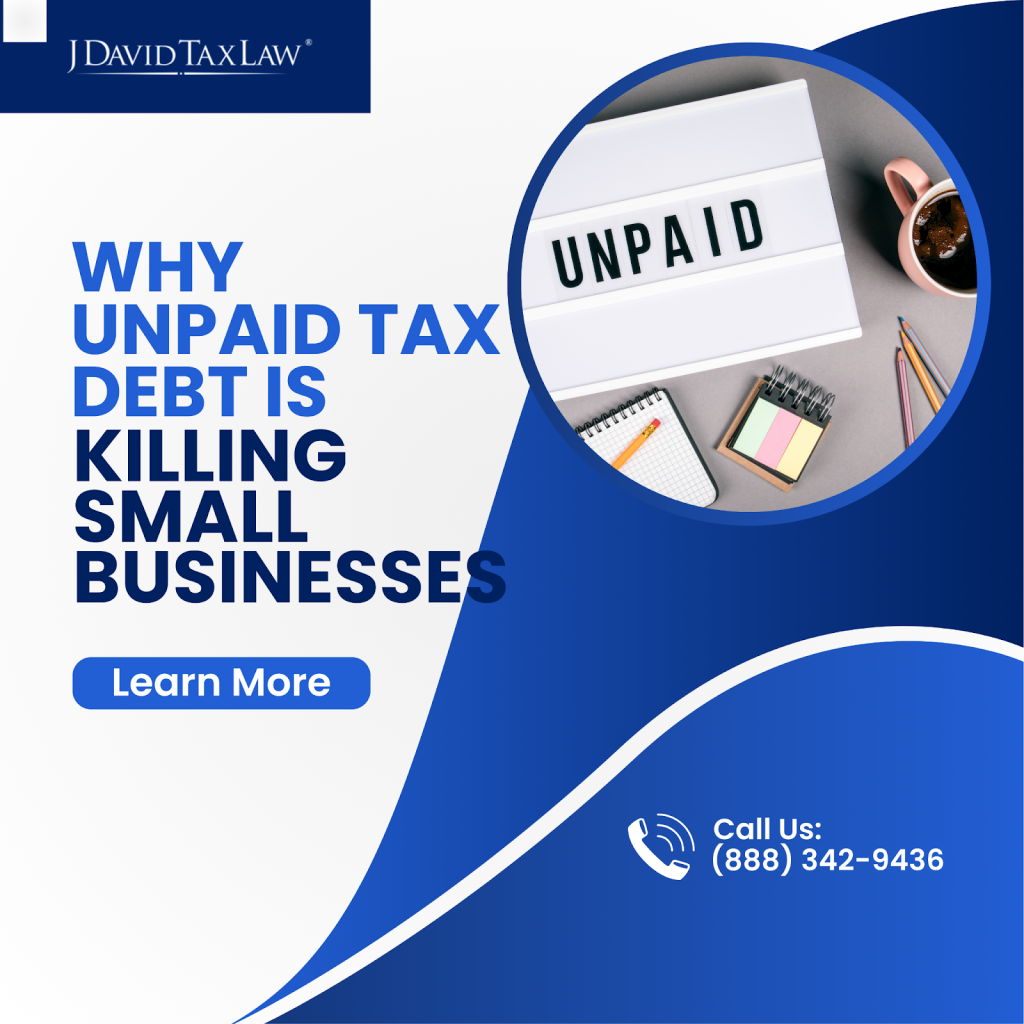Unpaid tax debts pose a serious threat to the sustainability of small businesses. When neglected, these financial obligations can damage any business. For business owners, settling tax liabilities is not just a legal duty but a crucial step toward ensuring ongoing business health.
J. David Tax Law specializes in helping businesses, from sole proprietorships to limited liability companies, navigate tax codes and liabilities. Their expertise ensures that businesses can meet their obligations and avoid the detrimental impacts of unpaid taxes.
Understanding Tax Obligations
Small businesses have various tax responsibilities. All are equally essential to maintain the financial health of the enterprise. Here’s a closer look at these responsibilities:
Corporate Income Tax
Corporations are subject to corporate income taxes, which are levied on the profits the company earns. The amount of corporate income tax businesses have to pay varies per location.
Proper management of corporate taxes stabilizes a company’s finances. It also supports job creation as it allows businesses to invest more in their operations and workforce.
Personal Income Taxes
Owners of LLCs that are sole proprietorships, S corporations and partnerships must pay personal income taxes on their business earnings. This responsibility means reporting income from the business on their individual tax returns. The effective tax rates for personal income vary based on the total income and deductions available to the individual.
In states with no personal income tax, like Florida, only federal tax rates apply. These range from 10% to 37% depending on total income and available deductions. This highlights the importance of accurate income reporting and understanding available tax credits to optimize tax savings.
Consequences of Unpaid Taxes to Small Businesses
Unpaid taxes have many consequences for small businesses and often lead to financial distress and business closure. When tax obligations are not met timely, the short and long-term effects can be severe.
Increased Financial Burden: Unpaid taxes can accumulate interest and penalties, which can grow over time. The daily interest rate on delinquent taxes can escalate the total debt. As a result, businesses will struggle to recover and meet their ongoing expenses. This extra burden can drain the financial resources of a small business. It can also divert funds that could be used for essential operations like employee salaries or inventory management.
Damage to Credit Rating: Tax liens, which the Internal Revenue Service may place on a business as a legal claim against the property for unpaid taxes, are a matter of public record. Such liens can damage a business’s credit rating. A lower credit score affects a business’s ability to secure loans, attract investment, or obtain business credit. All of these are essential for operations and expansion. Tax liens can also tarnish the business’s reputation, leading to a loss of business opportunities and partnerships.
Risk of IRS Audits and Penalties: Businesses with unpaid taxes are at a higher risk of being audited by the Internal Revenue Service (IRS). An IRS audit is demanding and requires a lot of time and resources to sort out financial records. If the IRS finds unpaid taxes or other discrepancies, the business could face hefty fines. These fines add to the financial pressures and disrupt operations. In addition, handling an audit can take focus away from daily activities, lowering productivity and affecting service.
Operational Disruptions: Managing tax disputes takes a lot of time and effort, which can disrupt business operations. When management focuses on resolving these issues instead of on growth, productivity drops. This shift can delay projects, lower employee morale, and cause missed business opportunities.
Constant disruptions may prevent the business from fulfilling contracts or maintaining service levels. Over time, this puts long-term client relationships and future revenue at risk.
Legal Consequences: The legal consequences of unpaid taxes are severe for small businesses. If taxes go unpaid, the Internal Revenue Service (IRS) may take drastic actions such as freezing bank accounts or seizing equipment and other valuable assets to recover the debt. These measures can severely cripple a business’s operations, potentially leading to a complete shutdown if essential assets are taken.
Loss of Business Reputation: Tax issues can damage a business’s reputation. When it becomes known that a business has unresolved tax liabilities, it can erode trust with customers and suppliers. Customers may choose competitors they perceive as more financially stable, and suppliers might demand more stringent payment terms, including upfront payments or reduced credit lines. Such shifts can strain operational capabilities and lead to reduced business activities and further financial difficulties.
Maintaining a positive reputation is crucial for business sustainability. It’s essential to address tax issues promptly with the help of experienced tax attorneys. This approach helps avoid penalties and preserves a business’s public image.
Restrictions on Business Operations: Unresolved tax debts can lead to serious restrictions on a business’s ability to operate. For instance, the Florida Department of Revenue or other regulatory bodies may revoke or deny essential business licenses or permits until outstanding taxes are settled. This can halt a company’s operations completely, particularly for businesses that heavily depend on licenses for legal operation, like those in retail, construction, or hospitality. Such restrictions not only disrupt current business but also deter potential future operations and expansion.
Impact on Future Revenue: The long-term financial stress caused by tax debt can critically limit a business’s growth opportunities. Continuous allocation of financial resources towards settling accrued penalties and interest reduces the capital available for business development, innovation, and expansion. Over time, this can stagnate the business, preventing it from adapting to market changes or investing in new opportunities. In severe cases, the ongoing financial burden may lead to business insolvency and failure, as the business becomes unable to sustain its operations financially.
Conclusion
The burden of unpaid taxes poses a substantial threat to the health and sustainability of small businesses. From financial strains and damaged credit ratings to severe legal repercussions and jeopardized business reputations, the consequences are far-reaching. To safeguard their operations and future growth, it’s vital for business owners to prioritize tax compliance.
J. David Tax Law offers expert guidance and solutions to navigate complex tax issues efficiently, ensuring businesses remain compliant and thrive. Don’t let tax challenges undermine your business success. Contact their team today to secure the future of your business.





















